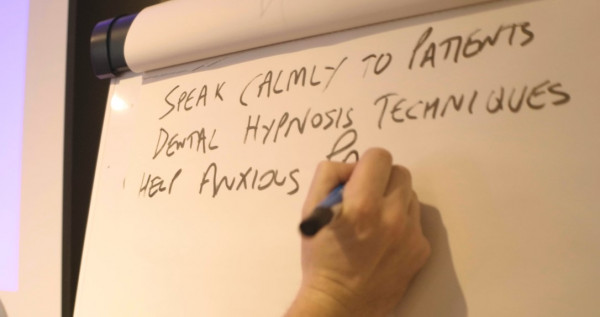What is Hypnosis
Defining Hypnosis
There have been many attempts to define ‘hypnosis’ over the years. The following is taken from the draft British Psychological Society
Statement produced by the British Society of Experimental and Clinical Hypnosis (BSECH), September 2000: “The term “hypnosis” denotes an interaction between one person, the “hypnotist”, and another person or people, the “subject” or “subjects”. In this interaction the hypnotist attempts to influence the subjects’ perceptions, feelings, thinking and behaviour by asking them to concentrate on ideas and images that may evoke the intended effects. The verbal communications that the hypnotist uses to achieve these effects are termed “suggestions”. Suggestions differ from everyday kinds of instructions in that a “successful” response is experienced by the subject as having a quality of involuntariness or effortlessness. Subjects may learn to go through the hypnotic procedures on their own, and this is termed “self hypnosis”.”
Some common misconceptions addressed:
Hypnosis is ‘magic’ and produce an effortless cure – Although therapy conveyed using hypnosis can be very dramatic and seems to require very little effort on the subject’s behalf, hypnosis is certainly not magical or supernatural.
Hypnosis can unlock ‘lost’ memories – Hypnosis can help to enhance memories, however, once a memory is lost, it is lost forever. Care has to be taken not to elicit so-called ‘false memories’.
Hypnosis requires complete immobility – It is important to know that it is OK to move during hypnosis. If you have an itch, it may cause more distraction if you do not move your hand to scratch it! Long-distance runners can experience trance while running!
Hypnosis is the therapy – Hypnosis is never the therapy itself. Hypnosis is an adjunct to treatment or therapy.
Remember, each case is individually assessed. Hypnosis is certainly not suitable or preferable for everyone. You should not agree to use hypnosis unless you are fully aware of what it is and how it could benefit you. Extra care has to be taken if the subject has a history of mental illness, and in some cases, hypnosis should be avoided.
Most people are hypnotisable to some degree. It is estimated that 30% of people will experience a light trance, 50% will experience a medium trance and 20% will experience a deep trance. Some people do not respond to hypnosis with one hypnotist but the chances are that another hypnotist, with whom they have a better rapport, will succeed.
By using hypnosis you can regain control of yourself and your body and help yourself to better physical and mental health.
In fact, hypnosis has been successfully used to alleviate problems from the time of pre-history and is one of the oldest of medical treatments. While other therapies have come and gone, Hypnosis has withstood the test of time, and remains as powerful and useful a treatment as it was then.

HYPNOSIS is defined in the Oxford English Dictionary as:
“Sleep artificially produced. State produced by hypnotism. Derived from the Greek word HYPNOS – meaning sleep”
During hypnosis, however, the subject is not asleep or unconscious.
A hypnotic subject is said to be in trance. Trance is a particular frame of mind characterised by focused attention, disattention to extraneous stimuli (‘tuning out’ of background noises etc.), and absorption in some activity, image, thought or feeling. People can and do enter this state spontaneously every day, for example, by being lost in thought or daydreaming, absorption in sport, reading, listening to music etc, driving for long distances and not recalling the route taken, being absorbed in meditation/relaxation procedures. Often in these examples there will be time distortion in that the passage of time is underestimated. Hypnotic procedures formalise this process of ‘entrancement’ and intensify it. Potential hypnotic subjects are given a series of instructions which, if they follow them, are intended to assist them in achieving a trance state. Many people who are hypnotised are not aware of being in a ‘hypnotic state’. This is because they expect to feel very different in hypnosis. They expect to feel ‘out, under, or zonked out’, which does not occur in hypnosis.
It is important to remember that the hypnosis does not constitute a form of treatment or therapy in its own right. Hypnosis is an adjunct, providing a context for the delivery of the treatment or therapy. Therapy incorporating hypnosis can only be as effective as the underlying therapeutic approach permits.
It is the view of many professionals that hypnosis should not be used as a form of entertainment, or for fun. Stage hypnosis is damaging to the reputation of medical, dental and clinical hypnosis as it conveys an inaccurate image. Although hypnosis is very safe, without a full medical and psychological assessment by a trained individual there are concerns regarding the safety of the participant. Stage hypnotists need not (and mainly do not) have any formal qualifications in hypnosis. Of course, it is up to each individual to make up their own mind if the want to participate, however, one must be aware of all the facts.
For what is Hypnosis used?
Hypnosis has been successfully used to alleviate problems from the time of pre-history and is one of the oldest of medical treatments. Whilst other therapies have come and gone, hypnosis has withstood the test of time, and remains as powerful and as useful a treatment as it was then.
Trained medical and dental hypnotherapists can help you to deal with a large variety of challenges that you face in your everyday life such as Asthma, Migraines, Anxiety & Stress, Smoking Cessation, Dental Problems, Insomnia, Weight Problems, Psychosexual Disorders, Depression, Pain Management, Irritable Bowel and many other conditions.
 By using hypnosis you can regain control of yourself and your body and help yourself to better physical and mental health.
By using hypnosis you can regain control of yourself and your body and help yourself to better physical and mental health.
Some common anxieties and concerns about hypnosis addressed:
Not remembering anything afterwards – There is not necessarily amnesia following a hypnosis session. Usually you will have full recollection, unless you have chosen, or it has been deemed beneficial to block specific memories.
Losing control – During hypnosis you are fully aware, and fully in control. Like the everyday trance experiences described previously, you never lose control. For example, if during a hypnosis session the subject became aware that the building was on fire, the subject would open their eyes and return to ‘normal’ without any prompting.
Not ‘waking up’ afterwards – If you are tired, you may fall asleep, however, no-one has ever been ‘stuck’ in trance. You would wake up naturally if unprompted.
Hypnosis may be dangerous – As discussed earlier, hypnotic trance can be compared to natural, everyday trance. So long as hypnosis is used by a responsible professional there should be no concerns regarding safety.
Being hypnotised against your will – It is impossible to trick someone into hypnosis or hypnotise someone who does not wish it to happen. The subject is in complete control at all times.
Being made to do something you would not normally do when hypnotised – A subject would never do anything which is against their morals or beliefs while hypnotised. A hypnotist can not make someone rob a bank, unless they wanted to rob a bank anyway!
Hypnosis might lead to unwilling disclosures – A subject will never disclose any information unless they are entirely comfortable to do so. Often it is not necessary for the hypnotist to know the exact details of the problem, so long as the subject is aware of them and the significance they may play to their treatment. Due to the confidential nature of the patient – hypnotist relationship, many people are surprised that they are happy to discuss issues which they may have never discussed before with anyone. This can happen if you have a good rapport with your hypnotist and can fully trust them.


